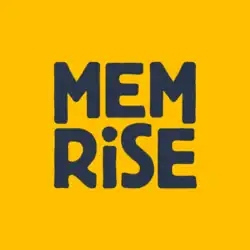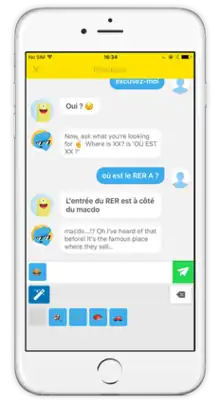Memrise
Memrise is a British language platform that uses spaced repetition of flashcards to increase the rate of learning,[2] combined with a GPT3-powered "AI Language partner" that allows learners to practice human-like conversations,[3] which Memrise believes can help learners to overcome the "confidence gap" in language acquisition. [4] It is based in London, UK.
 | |
Type of site | Privately held company |
|---|---|
| Available in | Arabic, Chinese, Danish, Dutch, English, French, German, Indonesian, Italian, Japanese, Korean, Norwegian, Polish, Portuguese, Russian, Spanish, Swedish, Turkish, Ukrainian, and Vietnamese |
| Founded | 2010 |
| Area served | Worldwide |
| Founder(s) | Greg Detre Ed Cooke Ben Whately [1] |
| CEO | Steve Toy |
| URL | memrise.com |
| Registration | Yes |
| Launched | September 2010 |
| Current status | Active |
Memrise offers user-generated content on a wide range of other subjects. The Memrise app has courses in 16 languages and its combinations, while the website has a great many more languages available.[5] As of 2018, the app had 35 million registered users.[6] Memrise has been profitable since late 2016, having a turnover of $4 million monthly.[7]
History
Memrise was founded by Ed Cooke, a Grand Master of Memory, Ben Whately and Greg Detre, a Princeton neuroscientist specializing in the science of memory and forgetting. The website launched in private beta after winning the Princeton Entrepreneurship Club 2009 TigerLaunch competition.[8]
On 1 October 2012, 100 users were allowed to sign up to test a non-beta version of the website called Memrise 1.0. As of May 2013, a Memrise app has been available for download on both the App Store (iOS)[9] and Google Play.[10]
As of January 2020, the app received $21.8 million of investments in a total of seven seed rounds.[11]
Spaced repetition
Memrise makes language studying a game, like its competitor Duolingo. Memrise uses spaced repetition to accelerate language acquisition.[2] Spaced repetition is an evidence-based learning technique that incorporates increasing intervals of time between subsequent review of previously learned material to exploit the psychological spacing effect.[12] The use of spaced repetition has been shown to increase the rate of memorization.[13]
Awards
In July 2010, Memrise was named as one of the winners of the London Mini-Seedcamp competition.[14] In November 2010, the site was named as one of the finalists for the 2010 TechCrunch Europas Start-up of the Year.[15] In March 2011, it was selected as one of the Techstars Boston startups.[16] In May 2017, Memrise was named as the winner of the "Best App" award at the second edition of the Google Play awards.[17]
Criticism
Starting in late February 2019, Memrise has been the subject of much criticism due to an announcement that user-created content will be moving to a different web-based platform.[18] It was announced that this new website would not have an app and that users would be unable to access their material offline.[19] In response, the Memrise forums were bombarded with posts criticizing this as a slap in the face to Memrise's users and content-creators.[20] This criticism has followed onto Reddit with many users calling for migration to rival platforms.[21] On 25 February 2020, as a response to the criticisms, Memrise decided to undo the split (i.e. closing Decks and merging its content back to the Memrise main site[22]).
In late September 2012, the leaderboard on the website was temporarily suspended due to "extensive cheating". Specific users had been using bots and non-intensive mechanisms, such as celebrity photo memory courses, to achieve atypical scores that were not reflective of actual learning. In response, the administrators established a new leaderboard after revising the scoring loopholes.[23]
See also
References
- "Ben Whately - founder's story".
- Shellenbarger, Sue. "Flashcards Get Smarter So You Can, Too". WSJ. Retrieved 24 June 2019.
- "Introducing the Membot". Memrise. Memrise.
- "How new technology can bridge the "confidence gap" in language education". Medium. 10 January 2023.
- "Learn Languages, Grammar & Vocabulary with Memrise - Apps on Google Play". 2018-12-27. Archived from the original on 2018-12-27. Retrieved 2019-02-24.
- "Memrise raises $15.5M as its AI-based language-learning app passes 35M users". 11 June 2018.
- "The Entrepreneur: Ed Cooke, Memrise". Startups.co.uk. 15 December 2016. Retrieved 2020-01-12.
- "TigerLaunch 2009". princetoneclub.com. Archived from the original on December 23, 2011.
- "Learn Languages with Memrise". App Store. Retrieved 2020-01-12.
- "Learn Languages with Memrise - Spanish, French - Apps on Google Play". play.google.com. Retrieved 2020-01-12.
- "Memrise raises $15.5M as its AI-based language-learning app passes 35M users". TechCrunch. 11 June 2018. Archived from the original on 2020-01-12. Retrieved 2020-01-12.
- "Human Memory: Theory and Practice", Alan D. Baddeley, 1997
- Smolen, Paul; Zhang, Yili; Byrne, John H. (25 January 2016). "The right time to learn: mechanisms and optimization of spaced learning". Nature Reviews Neuroscience. 17 (2): 77–88. arXiv:1606.08370. Bibcode:2016arXiv160608370S. doi:10.1038/nrn.2015.18. PMC 5126970. PMID 26806627.
- "Mini Seedcamps 2010". Seedcamp. Archived from the original on June 9, 2011.
- "The Europas – The Finalists". TechCrunch. AOL. 17 November 2010. Retrieved 20 January 2015.
- "TechStars Boston 2011: Who Got In". Boston.com. Retrieved 20 January 2015.
- Purnima Kochikar (May 19, 2017). "The winners of the 2017 Google Play Awards are ..." Play | Google Blog.
- "Important Update: Upcoming changes to Memrise community-created courses". Memrise. 2019-02-19. Retrieved 2019-02-24.
- "The Creation of Decks and the Future of Memrise". The Memrise Blog. 2019-02-21. Archived from the original on 2020-11-11. Retrieved 2019-02-24.
- "Angry about the Decks update? How to make your voices heard". Memrise. 2019-02-20. Retrieved 2019-02-24.
- "r/memrise - RIP Memrise". reddit. Retrieved 2019-02-24.
- "Important announcement about Decks". Memrise. 2020-02-12. Retrieved 2020-05-03.
- "The irrationality of cheating at gamified learning". Wired UK.
